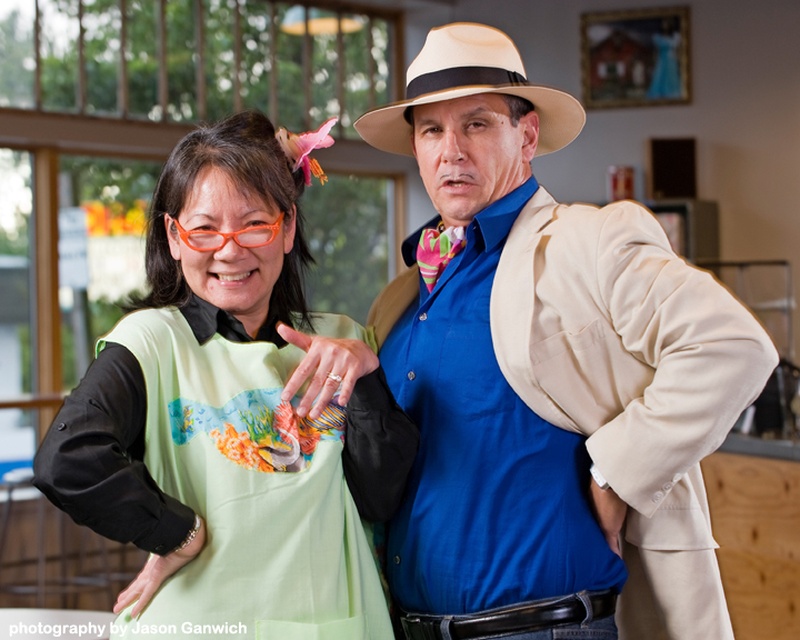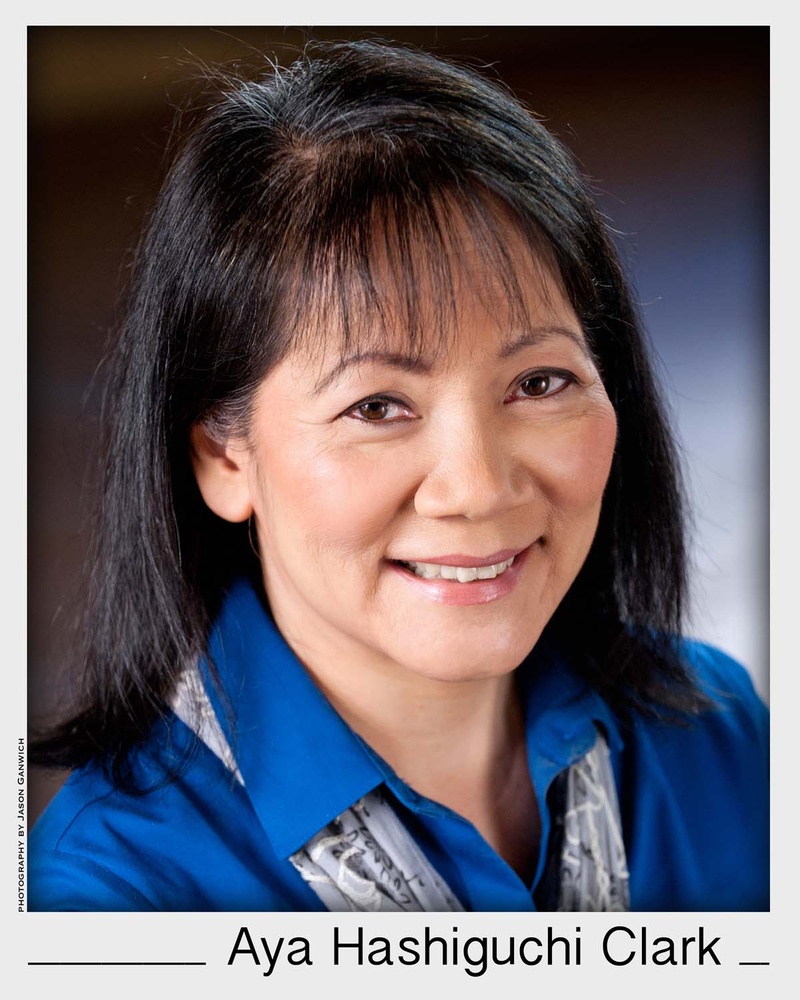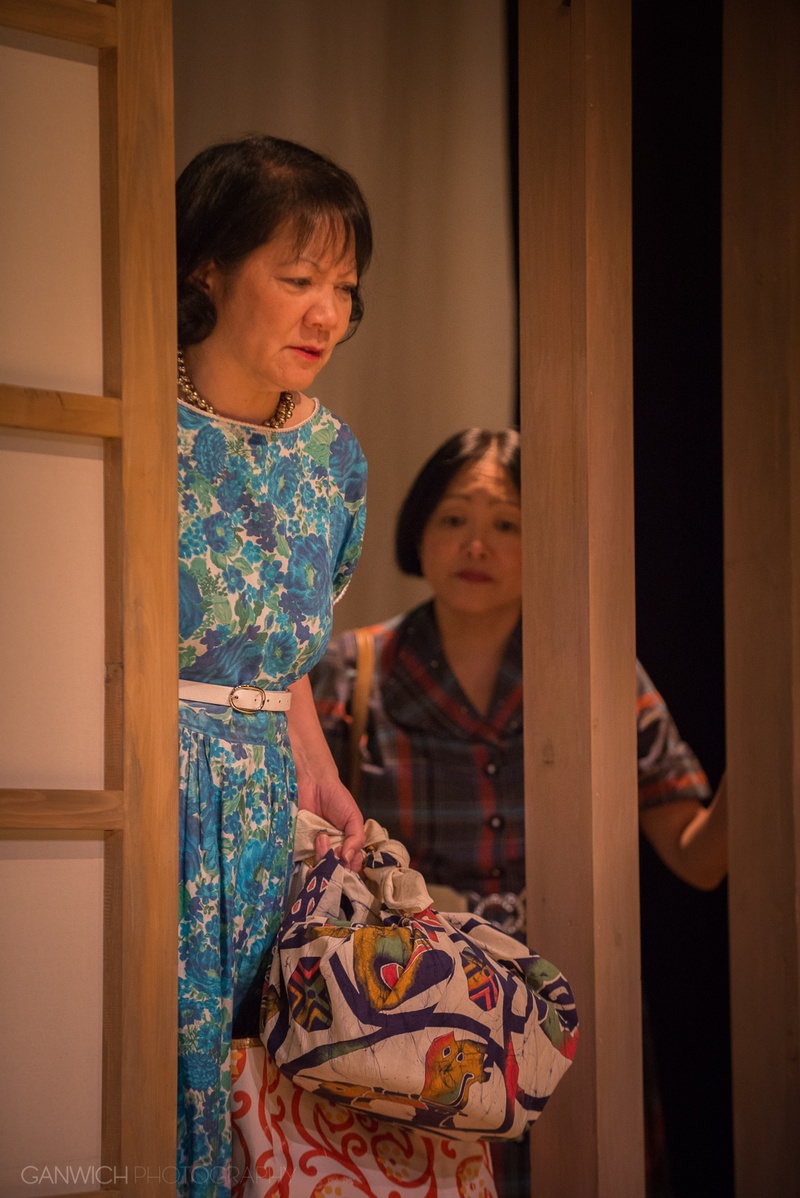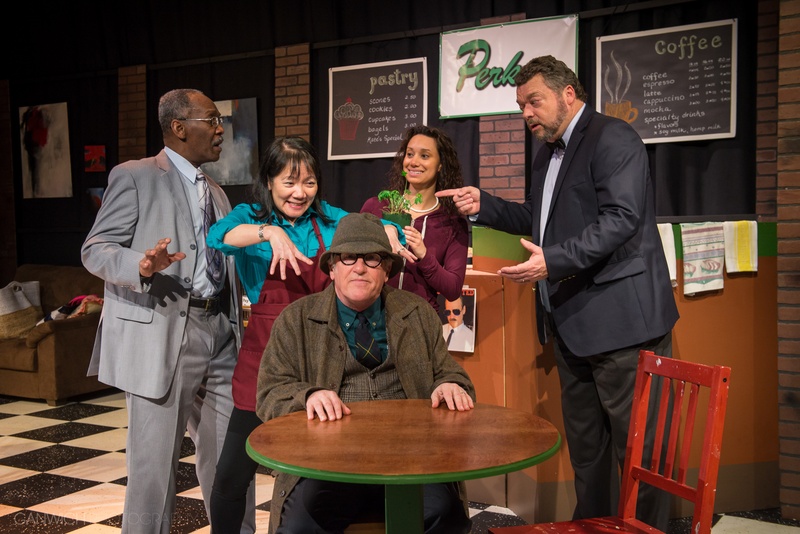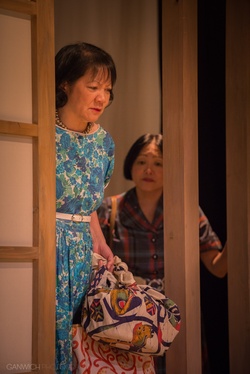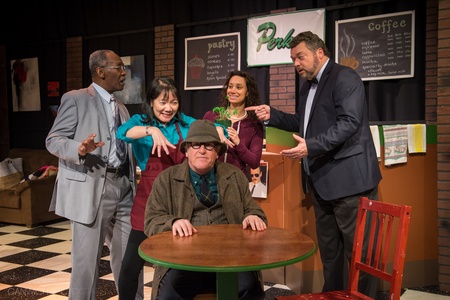Aya Hashiguchi Clark is a Nikkei actress and producer who lives in my hometown of Tacoma, Washington. She and her husband recently founded Dukesbay Productions, a theater company devoted to “[presenting] theatrical works that reflect and celebrate our diverse society in the Pacific Northwest,” as well as showcase “local actors who represent a diversity of ethnicity, age, religious background, training/experience, and acting type.” I’m grateful that Aya was able to spend some time talking to me about her theater experience and her reasons for founding Dukesbay.
The following conversation is a lightly edited version of our online chat interview.
* * * * *
Tamiko Nimura (TN): Could we maybe start by talking about your path to the theater?—when it started, how long you’ve been in the theater?
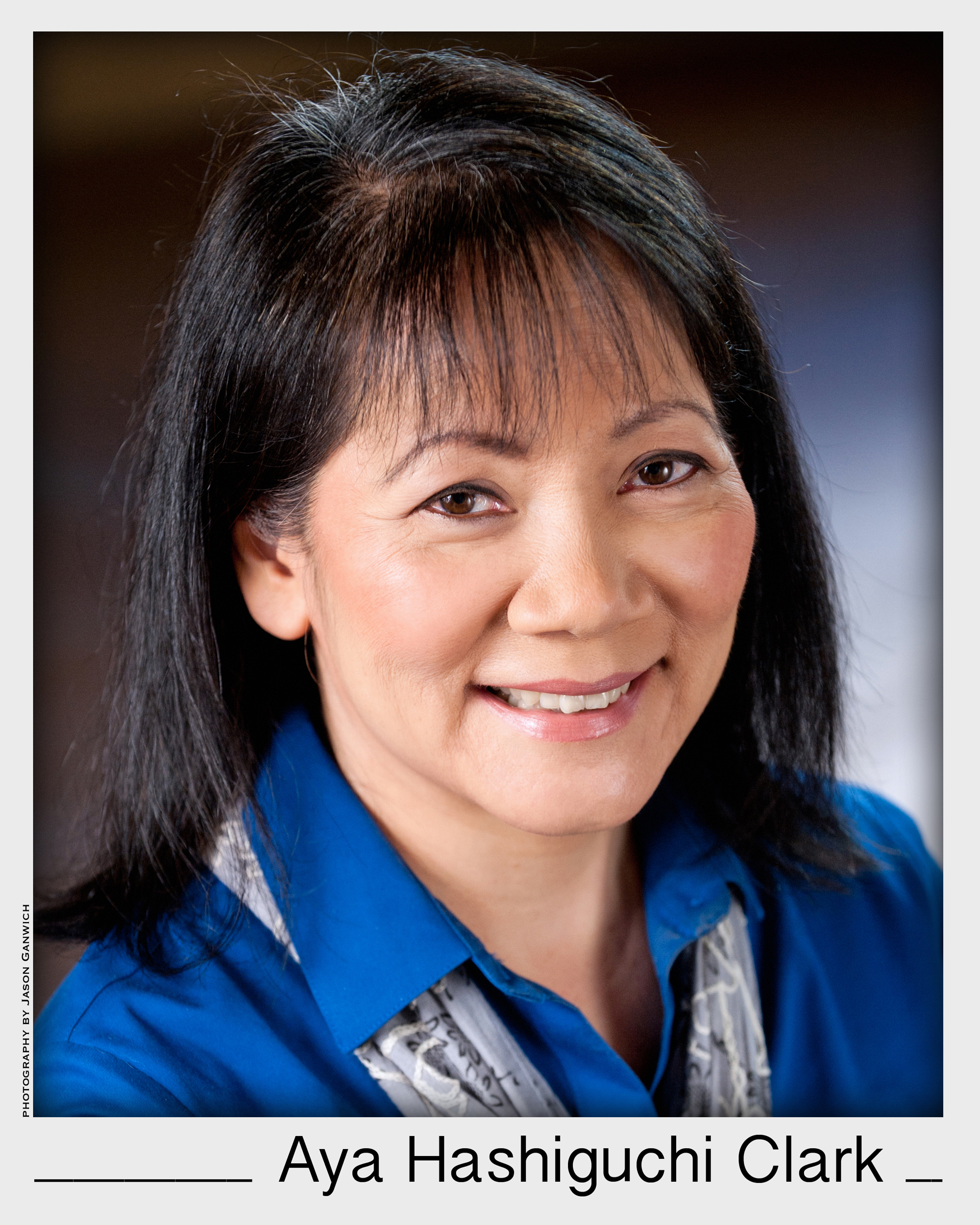
Aya Hashiguchi Clark (AHC): I always wanted to perform, ever since I was a little girl watching reruns of the Mickey Mouse club etc. I didn’t actually do it until I was in my late 30s. It took that long to get the courage!
TN: Wow, that’s amazing!
AHC: I started auditioning around town when I was about 37 years old. I auditioned for a whole year before anyone cast me in a production. My acting debut was at Burien Little Theatre, in their production of A Piece of my Heart in 1995.
TN: Is “around town” Seattle?
AHC: Yes, “around town” means the greater King Co area. A Piece of my Heart required an Asian American woman to portray a female soldier who served in Vietnam.
TN: Did you take any acting classes or training?
AHC: I actually have little to no formal training. I always considered the directors and experienced actors I’ve been on stage with as my teachers.
TN: You must learn quickly!
AHC: I don’t know if “quickly” is the term… I am still learning after 20 years!
TN: So (given the relatively small number of Asian/Asian American roles and actresses) I was going to ask you questions about your parents, if they were supportive of you as an artist…does that apply here? Since you started later, perhaps not?
AHC: My parents were always a bit hesitant to see my work. I believe my father, especially, was embarrassed by having his daughter on stage. In Japanese culture, you try not to call attention to yourself. Being on stage is the ultimate in calling attention to oneself!
TN: Right!
AHC: My second play that I was ever in was in 12-1-A at the NW Asian American Theater. It was a play about the internment. I think my parents eventually went to see it because all their Nisei friends had seen it and recommended it.
TN: What was the role?
AHC: The story is about two families who are interned. I played one of the moms of the one of the families. Her name was Mrs. Ichioka. She was the “outspoken” one…
TN: Were any of your family members incarcerated?
AHC: Yes, anyone who was alive during WWII [was] incarcerated. That included both parents and both sets of grandparents, and various aunts and uncles. I have a cousin who was born in camp.
TN: My dad and his family were also incarcerated. Where was your family held?
AHC: They were in Minidoka. I had a great grandfather who was incarcerated first, because he was considered a community leader, I guess. He was held separately in Missoula, MT.
TN: Did your parents ever talk about their experience?
AHC: No, not really. When pressed to, my mother will tell a few stories about her experience. She was in Jr. high at the time. My father was drafted into the army [in the 442nd] shortly after being interned. He served in France and Italy, but of course, most of the WWII vets did not speak of their time in service.
TN: My goodness, that’s a lot of history and silence to inherit. I was wondering what kind of preparation you had to do in order to prepare for that second role of the [Issei] mother.
AHC: I really couldn’t ask much about the camp experience, because of the silence, so I had to do the research the old fashioned way: by reading and watching documentaries, movies, etc. Because my character was so “spirited,” I patterned her after an Issei relative who I considered to be spirited in that way.
TN: Given your family history, how did that role affect you emotionally?
AHC: My grandmothers were both deceased by the time I played that role, but I felt a close bond with my maternal grandmother during that time. Before that play, I really hadn’t thought much about what she went through in keeping a family together under those trying circumstances. 12-1-A forced me to think about what it must have been like for her. I also felt very honored to portray someone from the Issei generation.
TN: How wonderful to have that opportunity for cross-generational empathy.
AHC: A theatre reviewer from one of the Asian community newspapers said that she saw her own grandmother in me as I was on stage. That remains the highest compliment I have ever received about my work as an actor.
TN: How lovely! What has your path (in theater) been like since those first two plays/roles? More roles increasingly, or a lack of roles?
AHC: When I look at my theatrical resume, about half of the roles I’ve played were written as Asian characters. The rest have been roles with no particular race mentioned.
However, good roles are very hard to find. There are many plays out there where no particular race is mentioned for any characters. But most directors assume that means those characters, by default, are caucasian.
TN: Right—I was just going to ask about that, casting opportunities. This seems like a good place to ask about Dukesbay and your reasons for founding it [with your husband]. Could you talk about that a bit?
AHC: By and large, the stories that America tells on stage are very White-centered. Playwrights like to write stories about The South, the Midwest, or New York Jews. No one envisions Asian Americans to be a part of those stories.
I have spoken with other actors who classify roles as “Asian roles,” “Black roles,” “Hispanic roles,” and “White roles.” But the white roles are basically anything that isn’t specifically written as “ethnic.”
Dukesbay Productions exists so we can provide balance to that mindset. We go out of our way to cast actors of color when a role doesn’t specifically tell us not to.
Did that make sense, that last statement?
TN: I think so, so casting (say) an African American man as the lead in Driving Miss Daisy?
AHC: Yes. Or casting a Caucasian man to play Atticus Finch, because the story wouldn’t make sense to cast an Asian or Black man in that.
TN: But also feeling free to cast an Asian American actor as (say) “Agamemnon”.
AHC: Exactly.
TN: What has the response been like for Dukesbay Productions? It sounds really exciting.
AHC: The overall response to our work has been positive. When putting on an ethnic-specific show like Driving Miss Daisy or Tea, the audience feels a whole world has opened up for them. They can experience a story that most other theaters are not necessarily telling. And when we cast multiracially, like in our comedy series Java Tacoma, it seems natural to everyone. It is not an ethnic show, it’s just good theatre.
TN: Right. You write those, yes?
AHC: That latest episode was written by me. I am currently working a first draft for the next episode. I do plan to collaborate with another local playwright on this one. Our next mainstage show will be Tennessee Williams’ The Night of the Iguana. Out of a cast of eight, four of the actors are persons of color. Tennessee Williams never imagined his play like that, but we do.
TN: Have you done any workshops with or for young actors of color? I wonder about that at times in Tacoma especially.
AHC: No I haven’t. I wish there were more educational opportunities aimed at young actors of color, but producing plays keeps me pretty busy. I just keep hoping that the existing programs out there for young people will reach out to students of color.
All the “big” theatre companies here in Pierce County (Tacoma Little Theatre, Lakewood Playhouse, and Tacoma Musical Playhouse…as well as Tacoma Youth Theatre and Broadway Center) all have youth programs. I do notice a small number of minority students in these programs, and am always hoping more enroll every year. This is the best way to encourage young people to explore theatre.
TN: What are your hopes for Dukesbay eventually?
AHC: Believe it or not, we don’t have aspirations to grow larger. We perform in a 40-seat theater, and we like the small intimate space. So does our audience.
I would like to continue to produce both ethnic-specific work and “mainstream” work that will incorporate multiracial talent.
I also am working toward cultivating a multiracial talent pool in Tacoma. I want actors of color to be visible, and I want other theatre companies to know we are out there, and are ready and willing to perform with all of them.
I do want to give kudos to Tacoma Musical Playhouse, who have gone out of their way to produce musicals that showcase ethnic talent. They are terrific!
Over the years, they have produced The Color Purple, Flower Drum Song, and other works showcasing actors of color.
TN: And you were in Joy Luck Club, is that right?
AHC: Yes, Joy Luck was produced by Tacoma Little Theatre. My husband Randy Clark was instrumental in bringing that production to Tacoma. We had a mixture of both King Co and Pierce Co talent in that show.
TN: I was tempted to audition, but rehearsals would have been very tricky for me. Congratulations on that production!
AHC: Thank you! I wish you could have auditioned for that. We could have met much sooner!
TN: I don’t want to take up too much of your time—and would definitely love to meet in person—but I was wondering if you had any advice for aspiring Asian American actors, in the Northwest especially?
AHC: The best advice I would give is this: Don’t Give Up. Auditioning can be a difficult thing, especially if you’re trying to get cast in a non-Asian role, but keep at it. If directors see that Asian actors do indeed exist and see us on a regular basis, they might stop thinking of us as only “Asian Actors,” and start seeing us as “Actors.” That is our hope.
© 2015 Tamiko Nimura


